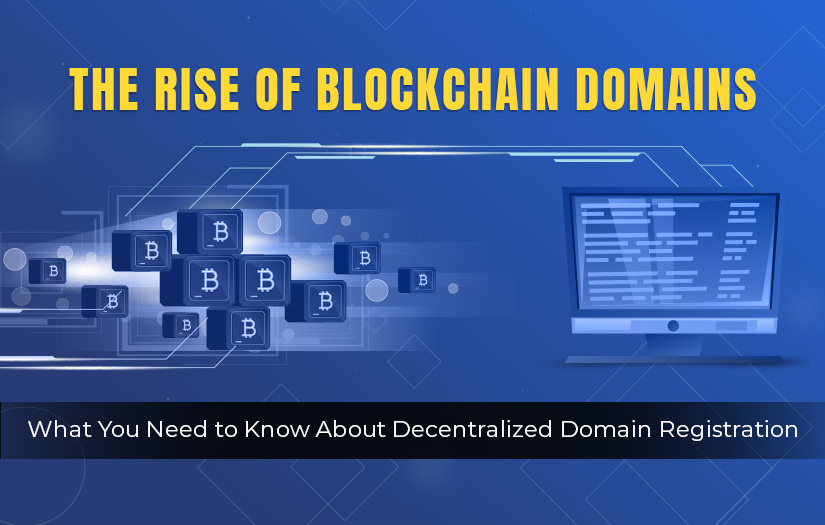Blockchain technology is changing the way domains are being registered and managed by introducing what is called blockchain domains. These challenge traditional notions of internet addresses and online ownership. Unlike conventional domains controlled by centralized authorities, decentralized domain registration depends upon blockchain networks, providing better security, ownership rights, and freedom from outside interference. As the internet moves toward the decentralized web, understanding Web3 domains will be crucial in navigating the future of the digital landscape.
How Blockchain Domains Differ from Traditional Domains
This, itself, tells of the enormous difference in nature between blockchain domains and traditional systems. Whereas in the conventional domains, there were such centralized entities as ICANN (Internet Corporation for Assigned Names and Numbers) and DNS (domain name system); as far as crypto domains are concerned, all the above is on decentralized ledgers and needs no intermediary to provide the owner with absolute ownership.
They are usually minted as NFT domains on such platforms as Ethereum domains or Polygon domains; ownership is coupled with a cryptocurrency wallet. Such a decentralized approach means that no one can seize or change the domain, which is a big difference from the traditional system. Popular extensions such as .crypto, .eth, and .nft reflect their connection to Web3 domains and appeal to blockchain enthusiasts.
The Benefits of Blockchain Domains
It also has some pros over traditional domains: blockchain domains will replace the conventional concept of a domain as a rental agreement, allowing decentralized domain registration with an option for actual ownership of the domain. True ownership allows the purchased owner to take control perpetually without requiring any renewal fee after buying the domain. Transparency via blockchain technology offers security and verifiable ownership.
These domains are also highly secure, owing to their cryptographic nature, and are resistant to being hacked or changed by unauthorized parties. Moreover, because of their censorship-resistant design, users can publish anything without the threat of takedowns or external interference, hence in tune with the decentralized web.
The purposes that blockchain domains serve go further than hosting websites; they ease cryptocurrency transactions by converting lengthy, complex wallet addresses to mnemonic names such as yourname.crypto. They also allow frictionless integration with Web3 domains, which act like digital identities for interacting with decentralized applications and blockchain-based services. Because of this, blockchain domains have massive value in industries ranging from digital identity and content publishing to brand protection, showing their full potential in a decentralized future.
Challenges Faced by Blockchain Domains
Despite the advantages, there are tremendous challenges in the way of blockchain domains. Adoption is an issue: most browsers and applications by default do not support a Web3 domain. Users often have to seek plugins or manual configuration, building barriers to adoption.
This censorship resistance in decentralized domain registration may have some downsides, too, because this allows for its misuse for illegitimate purposes, raising some ethical and regulatory red flags. In fact, the speculative demand for popular NFT domains has driven the price to levels unaffordable by many users. Operating them requires familiarity with blockchain wallets and decentralized systems that discourage non-technical users from attempting to do so.
From a technical perspective, this is exacerbated by the incompatibility between the blockchain domain and traditional domain name system, or DNS, protocols. If traditional domains make use of DNS infrastructure managed by ICANN, then Ethereum domains and Polygon domains employ different protocols altogether. These are some issues, such as native browser support and better user interfaces that need to be solved by developers to make blockchain domains more usable.
The Future with Blockchain Domains
The rise of blockchain domains represents a movement of decentralization and empowerment to the user in the virtual world. Still, traditional domains dominate, but Web3 domains have managed to cut a niche for themselves with cryptocurrency enthusiasts and blockchain pioneers. As the technology matures, improvements in browser compatibility, cost reduction, and regulatory clarity are expected to drive broader adoption.
In the future, it could also be that blockchain domains and traditional domains will coexist in a hybrid model to serve different needs. They also stand in line with the ideas of a decentralized web by offering secure, censorship-resistant, user-owned digital identities. Whether as a crypto user, tech entrepreneur, or simple curious mind about what the future of the internet will be, blockchain domains are a very exciting opportunity to explore a more democratic approach to online presence. These innovations are the building blocks that will continue to be in the core of change as the internet evolves further towards a more decentralized and user-centric future.






